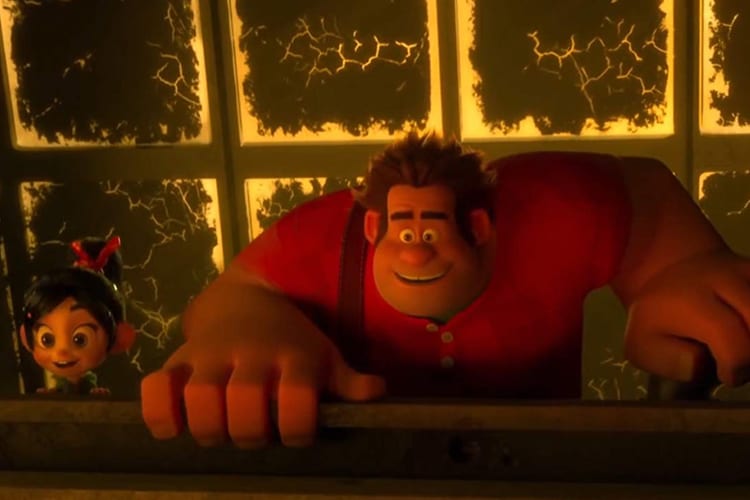“Wreck-It Ralph” was one of Walt Disney Animation’s more original projects. An ode to the creative freedom of video games, a moving portrait of friendship, and a feat of animation all in one, Ralph’s first adventure was a sign that Disney had trailblazing spirit left in them. But the times, they are a-changin’: the house of mouse’s appetite for money has grown, because how else will it buy mega-properties like Marvel and Star Wars? And so we find Walt Disney Animation releasing “Ralph Breaks the Internet”, the studio’s first direct sequel since “The Rescuers Down Under” in 1990—desperate times, and so on.
The movie doesn’t inspire confidence that it exists because someone had a great idea for a “Wreck-It Ralph” sequel. Right off the bat, titular hero Ralph (John C. Reilly) and his young buddy Vanellope (Sarah Silverman) are sitting around and practically discussing which stage of the screenplay they’re in. “Wow, our world is so ordinary and we love it this way!” says Ralph. “If a new thing enters the mix, whatever will happen to our status quo?” wonders Vanellope. Well, those aren’t the exact lines, but they’re close. The characters are prone to announcing their conflicts and changes, almost as if they’re trying to justify the sequel’s existence to themselves: of course they need another movie, dummy, don’t you hear them talking about how they could grow as people?
It only gets more transparent—the main life lesson is introduced in a line of dialogue that contains the words “life lesson”. Unfortunately, some of the movie’s lessons revolve around its big, new franchise addition: the Internet. Ralph and Vanellope travel into the World Wide Web to find a piece for Vanellope’s arcade game, which is in danger of breaking down. After they discover how much the piece costs on eBay, Ralph finds out how to make money by going viral, which the movie depicts as fun and lucrative. Yes, that’s the best message for impressionable youth to hear: you can get rich by being a popular idiot on the Internet. It’s like Disney is breeding future Jake Pauls to recruit before they inevitably self-destruct in displays of highly publicized hedonism.
At least “Ralph Breaks the Internet” looks pretty all the while. This vision of an Internet landscape is lovingly put together, and its virtual world is full of clever touches. The sequel improves upon the outstanding animation of “Wreck-It Ralph” in every conceivable dimension—Disney’s team has mastered the art of fluid and distinctive computer animation. Where it falters in its replication of the Internet, though, is in the use of meme humor.
Memes are, by their very nature, self-contained and non sequitur: people enjoy memes because they’re understood implicitly and quickly moved on from. A meme is a flash in the pan, an in-joke that is only meant to exist suddenly and independently. That’s why using meme humor in a narrative—as a small part of a greater whole—inherently doesn’t work. It gives them more meaning than they were meant to have. When “Ralph Breaks the Internet” incorporates memes into its plot, they’re dead on arrival.
The murder of memes doesn’t compare to the movie’s most egregious insult, however. Disney’s own website gets a whole scene, and it feels a lot like bragging: “look at all the properties we own! There are Star Wars characters over here and a Pixar logo over there! Thanks for your business!” The marketable Disney princesses even poke fun at how Disney movies recycle the same plot beats—in the middle of a Disney movie that’s been using recycled plot beats. Disney is laughing at you for spending money on a formulaic movie and showing you what they’re using your money to buy. It’s grossly corporate.
And yet, “Ralph Breaks the Internet” makes a miraculous recovery in its third act by embracing the true spirit of the Internet: being bizarre and nonsensical because it has nowhere else to go. With the help of an utterly ridiculous finale and a heap of unsettling imagery, the sequel finally owns its weird premise. And then, by some sort of alchemy, it sticks the landing with a poignant ending that tugs at the heartstrings of anyone who’s left adolescence behind. Leave it to Walt Disney Animation to pull off an emotional ending after a mediocre movie.
But still, most of “Ralph Breaks the Internet” feels like a perfunctory cash-in sequel, which doesn’t bode well for the studio’s future projects. Perhaps we should stifle our optimism for—let me check their production schedule—“Frozen 2”. Oh no.
★★½ (2.5/5)




